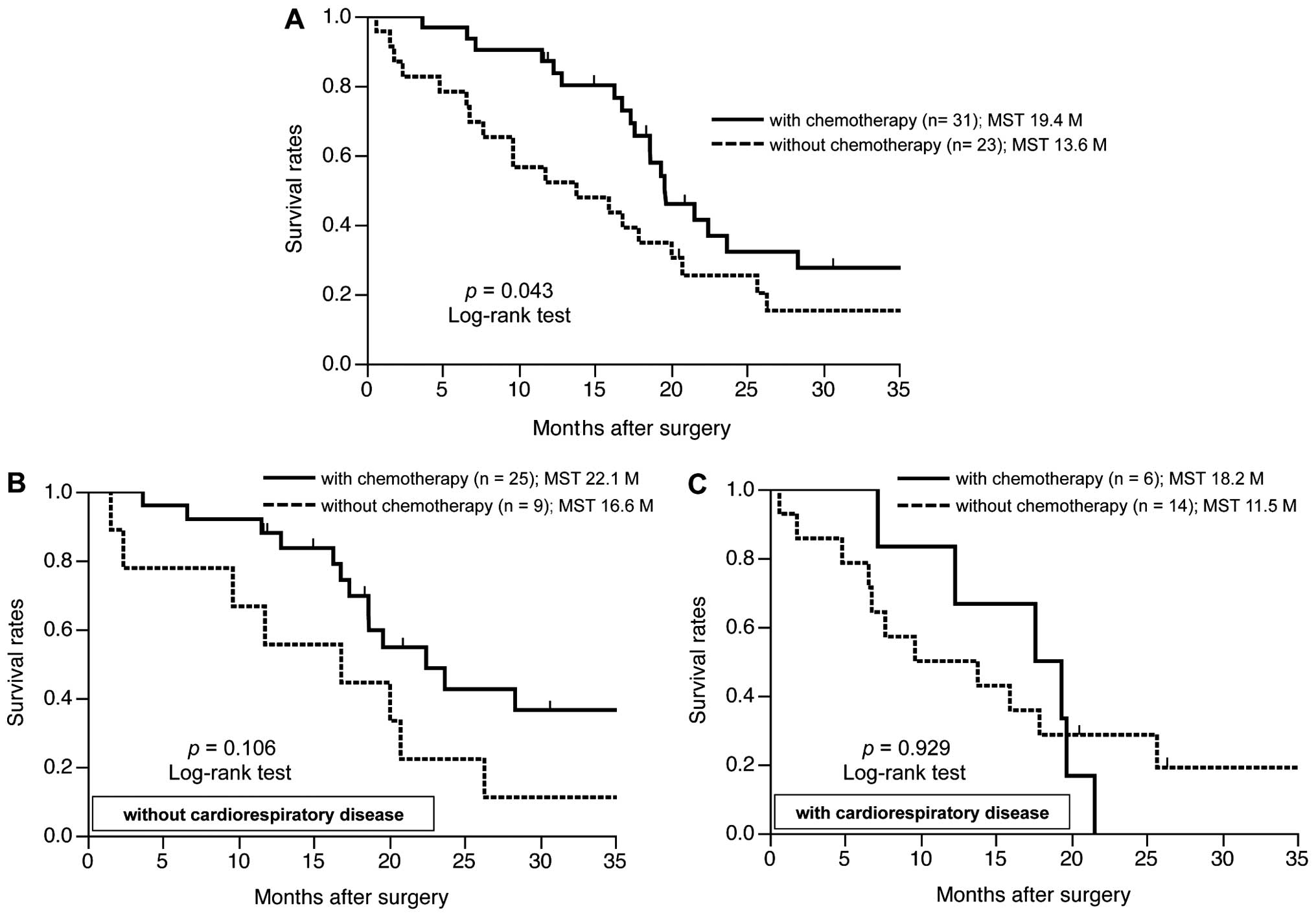|
1
|
Parkin DM, Bray F, Ferlay J and Pisani P:
Global cancer statistics, 2002. CA Cancer J Clin. 55:74–108. 2005.
View Article : Google Scholar
|
|
2
|
Ries LAG, Krapcho M, Mariotto A, Miller
BA, Feuer EJ, Clegg L, Horner MJ, Howlader N, Eisner MP, Reichman M
and Edwards BK: SEE. cancer statistics review. 1975–2004. National
Cancer Institute; Bethesda, MD: 2013
|
|
3
|
Glimelius B, Hoffman K, Haglund U, Nyren O
and Sjoden PO: Initial or delayed chemotherapy with best supportive
care in advanced gastric cancer. Ann Oncol. 5:189–190.
1994.PubMed/NCBI
|
|
4
|
Murad AM, Santiago FF, Petroianu A, Rocha
PR, Rodrigues MA and Rausch M: Modified therapy with
5-fluorouracil, doxorubicin, and methotrexate in advanced gastric
cancer. Cancer. 72:37–41. 1993. View Article : Google Scholar : PubMed/NCBI
|
|
5
|
Pyrhonen S, Kuitunen T, Nyandoto P and
Kouri M: Randomised comparison of fluorouracil, epidoxorubicin and
methotrexate (FEMTX) plus supportive care with supportive care
alone in patients with non-resectable gastric cancer. Br J Cancer.
71:587–591. 1995. View Article : Google Scholar
|
|
6
|
Al-Batran SE, Hartmann JT, Probst S, et al
Arbeitsgemeinschaft Internistische Onkologie: Phase III trial in
metastatic gastroesophageal adenocarcinoma with fluorouracil,
leucovorin plus either oxaliplatin or cisplatin: a study of the
Arbeitsgemeinschaft Internistische Onkologie. J Clin Oncol.
26:1435–1442. 2008. View Article : Google Scholar
|
|
7
|
Boku N, Yamamoto S, Fukuda H, et al:
Fluorouracil versus combination of irinotecan plus cisplatin versus
S-1 in metastatic gastric cancer: a randomised phase 3 study.
Lancet Oncol. 10:1063–1069. 2009. View Article : Google Scholar : PubMed/NCBI
|
|
8
|
Kang YK, Kang WK, Shin DB, et al:
Capecitabine/cisplatin versus 5-fluorouracil/cisplatin as
first-line therapy in patients with advanced gastric cancer: a
randomised phase III noninferiority trial. Ann Oncol. 20:666–673.
2009. View Article : Google Scholar
|
|
9
|
Koizumi W, Narahara H, Hara T, et al: S-1
plus cisplatin versus S-1 alone for first-line treatment of
advanced gastric cancer (SPIRITS trial): a phase III trial. Lancet
Oncol. 9:215–221. 2008. View Article : Google Scholar : PubMed/NCBI
|
|
10
|
Van Cutsem E, Moiseyenko VM, Tjulandin S,
et al V325 Study Group: Phase III study of docetaxel and cisplatin
plus fluorouracil compared with cisplatin and fluorouracil as
first-line therapy for advanced gastric cancer: a report of the
V325 study group. J Clin Oncol. 24:4991–4997. 2006.PubMed/NCBI
|
|
11
|
Webb A, Cunningham D, Scarffe JH, et al:
Randomized trial comparing epirubicin, cisplatin, and fluorouracil
versus fluorouracil, doxorubicin, and methotrexate in advanced
esophagogastric cancer. J Clin Oncol. 15:261–267. 1997.
|
|
12
|
Catalano V, Bisonni R, Graziano F, et al:
A phase II study of modified FOLFOX as first-line chemotherapy for
metastatic gastric cancer in elderly patients with associated
diseases. Gastric Cancer. 16:411–419. 2013. View Article : Google Scholar : PubMed/NCBI
|
|
13
|
Jin Y, Qiu MZ, Wang DS, et al: Adjuvant
chemotherapy for elderly patients with gastric cancer after D2
gastrectomy. PLoS One. 8:e531492013. View Article : Google Scholar : PubMed/NCBI
|
|
14
|
Kim JH, Kim HS, Han AR, et al: Irinotecan,
leucovorin and 5-fluorouracil (modified FOLFIRI) as salvage
chemotherapy for frail or elderly patients with advanced gastric
cancer. Oncol Lett. 4:751–754. 2012.
|
|
15
|
Koizumi W, Akiya T, Sato A, et al: Phase
II study of S-1 as first-line treatment for elderly patients over
75 years of age with advanced gastric cancer: the Tokyo Cooperative
Oncology Group study. Cancer Chemother Pharmacol. 65:1093–1099.
2010.PubMed/NCBI
|
|
16
|
Lee JL, Kang YK, Kang HJ, et al: A
randomised multicentre phase II trial of capecitabine vs S-1 as
first-line treatment in elderly patients with metastatic or
recurrent unresectable gastric cancer. Br J Cancer. 99:584–590.
2008. View Article : Google Scholar
|
|
17
|
Trumper M, Ross PJ, Cunningham D, et al:
Efficacy and tolerability of chemotherapy in elderly patients with
advanced oesophago-gastric cancer: A pooled analysis of three
clinical trials. Eur J Cancer. 42:827–834. 2006. View Article : Google Scholar : PubMed/NCBI
|
|
18
|
Sobin LH, Gospodarowicz MK and Wittekind
C: TN. classification of malignant tumours. 7th. Wiley-Blackwell;
New York, NY: 2009
|
|
19
|
Kang JH, Lee SI, Lim do H, et al: Salvage
chemotherapy for pretreated gastric cancer: a randomized phase III
trial comparing chemotherapy plus best supportive care with best
supportive care alone. J Clin Oncol. 30:1513–1518. 2012. View Article : Google Scholar : PubMed/NCBI
|
|
20
|
Thuss-Patience PC, Kretzschmar A, Bichev
D, et al: Survival advantage for irinotecan versus best supportive
care as second-line chemotherapy in gastric cancer - a randomised
phase III study of the Arbeitsgemeinschaft Internistische Onkologie
(AIO). Eur J Cancer. 47:2306–2314. 2011. View Article : Google Scholar
|
|
21
|
Caillet P, Canoui-Poitrine F, Vouriot J,
et al: Comprehensive geriatric assessment in the decision-making
process in elderly patients with cancer. ELCAPA study: J Clin
Oncol. 29:3636–3642. 2011.PubMed/NCBI
|
|
22
|
Extermann M and Hurria A: Comprehensive
geriatric assessment for older patients with cancer. J Clin Oncol.
25:1824–1831. 2007. View Article : Google Scholar : PubMed/NCBI
|
|
23
|
Pal SK, Katheria V and Hurria A:
Evaluating the older patient with cancer: understanding frailty and
the geriatric assessment. CA J Clin. 60:120–132. 2010. View Article : Google Scholar : PubMed/NCBI
|















